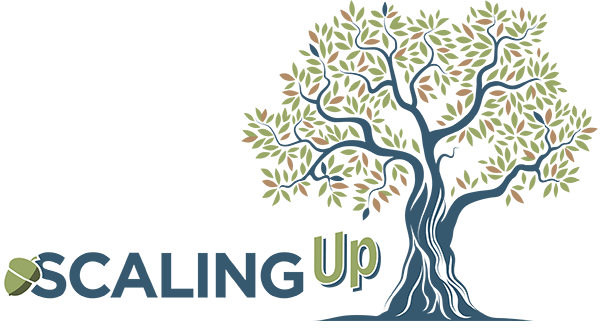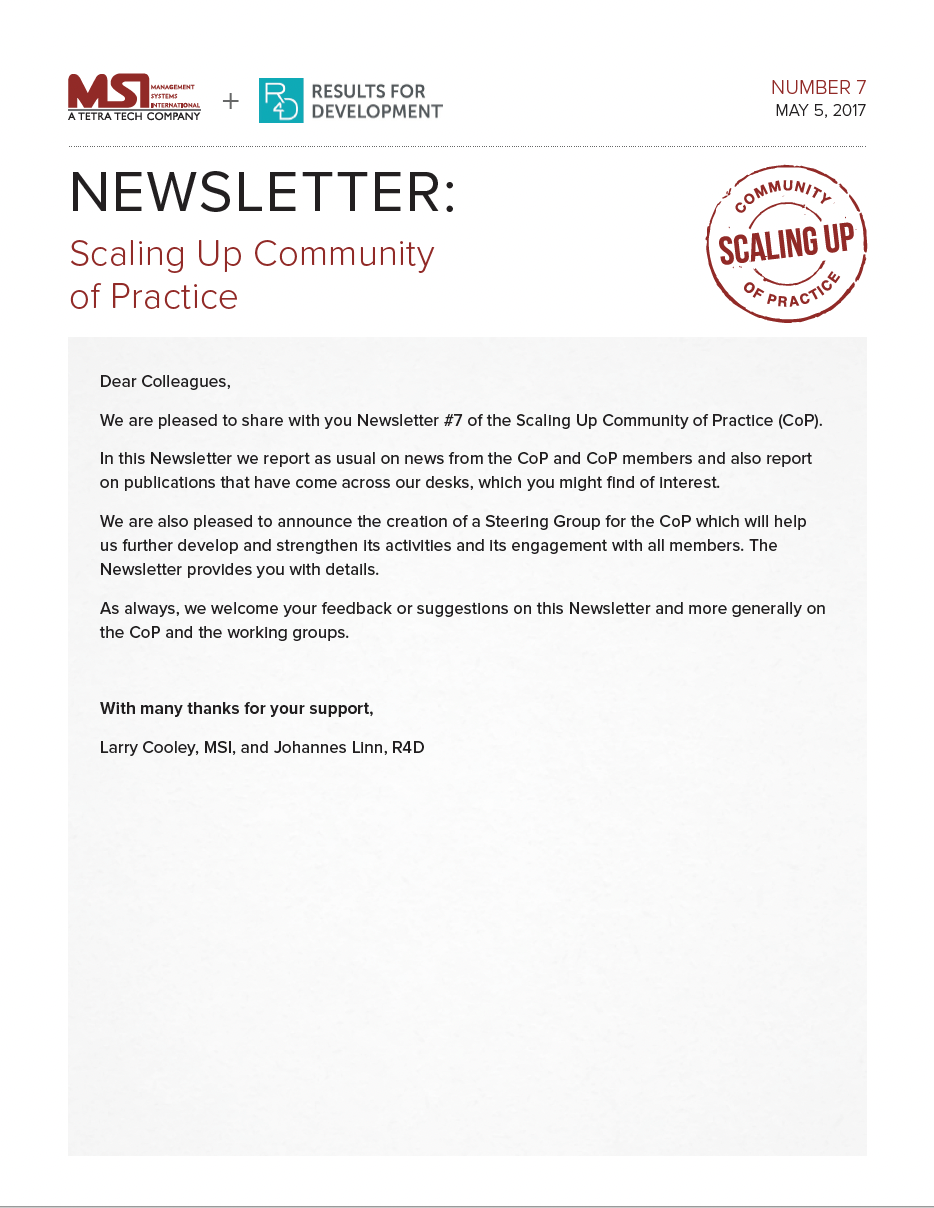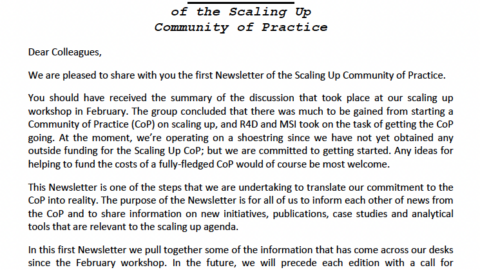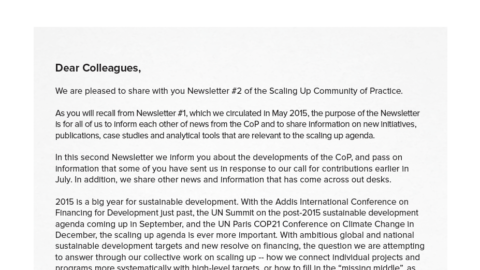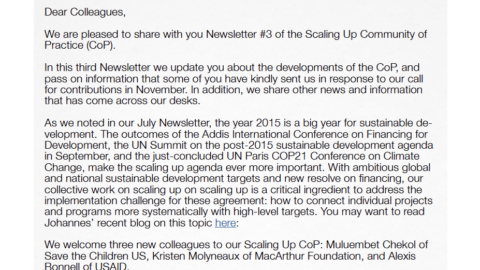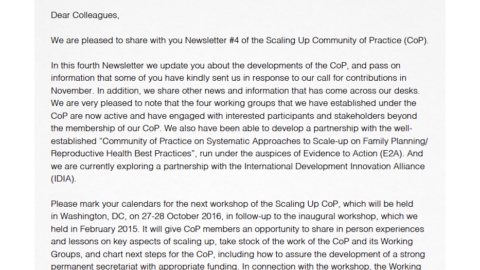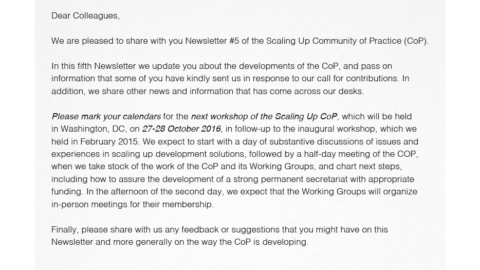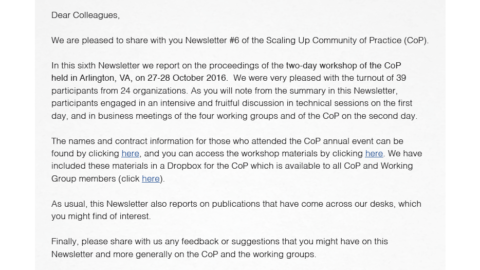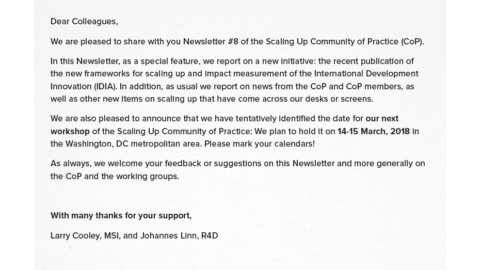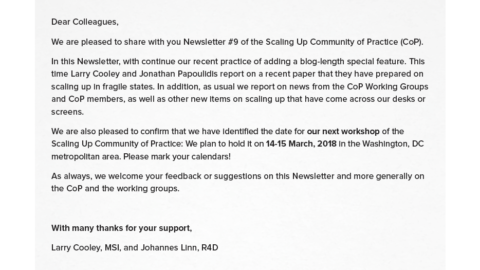News of the Scaling Up Community of Practice
Steering Group for the Community of Practice
MSI and R4D have served as a de-facto board and secretariat for the Community of Practice (CoP) on a pro bono basis. The secretariat issues a quarterly newsletter, supports the formation and operation of the working groups, and organized the first two annual CoP workshops in February 2015 and October 2016 in Arlington, VA.
Based on discussions at the October 2016 CoP event, MSI and R4D have been exploring the possibility of establishing a CoP steering group. The Steering Group (SG) will consist of six to eight CoP members drawn from among current CoP members. The composition and membership of this core group could change over time based on the interest expressed by other organizations/ individuals and agreement by the members of the SG.
The terms of reference below provide broad guidance on the functioning of this steering group.
- One member of the SG will serve as Chair; the Chair will rotate among the SG members and at the discretion of the SG members, preferably not more frequently than once a year.
- The SG will normally convene two to three times a year (usually virtually) at the initiative of the Chair or at the request of an SG member.
- The SG will agree on the timing, location and purpose of the annual CoP event, prepare the agenda for these events, contribute substantively to their content, and prepare summaries of the proceedings as appropriate.
- The SG will manage the preparation of quarterly CoP newsletters.
- The SG will periodically review membership of the CoP, the list of working groups, and membership in the various working groups, and will encourage outreach to new members as appropriate.
- The SG will review once a year the experience of the CoP, propose any changes in its operations, and report to the CoP at its annual meetings about progress of the CoP and any potential changes in its operations.
- The SG will explore the desirability and feasibility of attracting funding to support selected activities of the CoP.
CoP participants from the following organizations have agreed to join the Steering Group: GIZ, J-PAL, MacArthur Foundation, MasterCard Foundation, UNDP, University of Michigan, USAID, and World Vision, in addition to MSI and R4D. Future Newsletters will report on the activities of the Steering Group.
Sectoral and Thematic Working Groups
The Community of Practice includes four working groups under the umbrella of the Scaling up Community Practice. In addition, we have linked up with the Community of Practice on Systematic Approaches to Scale-Up of Family Planning/Reproductive Health Best Practices. Below is a summary of initiatives by several of these working groups. If you would like to join one or more of the CoP Working Groups, please contact the lead organizers noted in the first column.
| Working Group Topic | Working Group Coordinators | Current Status of Working Group (WG) |
|---|---|---|
| Scaling up in Education | Molly Eberhardt (R4D) meberhardt@r4d.org Caitlin Moss (R4D) cmoss@4rd.org | The Education Working Group held an initial meeting of the executive committee for the group in February 2017, with EC members including Mary Burns (EDC), Cory Heyman (Room to Read), and JPAL (John Floretta and Meagan Neal). Laura Ghiron (ExpandNet) and Nitika Tolani (MSI) will participate in the executive committee but were unable to join the meeting due to travel. The group agreed that going forward, members of the executive committee can convene and host calls centered on specific themes or questions once every few months, depending on interest and capacity. Potential themes that could be addressed during such calls include working with government to move from pilot to scale, scaling up education interventions in humanitarian situations, and maintaining fidelity and quality of a model while scaling. EC members proposed that some of the time during calls could be devoted to examining scale up “cases” in education. The group also expressed a desire to communicate through an informal forum such as a Google Group, and EC members are exploring options for this going forward. |
| Scaling up in Fragile States | Jonathan Papoudilis (World Vision) jpapouli@worldvision@org | The Scaling-Up in Fragile States Group began in May 2016 and currently has 16 COP members ranging from bilateral donors, multilateral development banks, universities, think tanks and aid agencies. The Group’s work to date has focused on framing the challenges and opportunities of scaling in fragile states by drawing on our members’ perspectives, priorities and operations. The Group continues to serve as a platform for thought leadership in this space, as well as a repository and distributor of member (and broader community) research, policy reports and other resources that inform scaling in difficult contexts. Looking forward, the Group will increasingly focus on how the principles and practice of resilience, adaptive development, political economy analysis and problem-driven iterative adaptation can enrich approaches to scaling-up in the hardest places. On behalf of the group, MSI and WV are developing a publication on scaling-up in fragile states to capture emerging trends, insights and opportunities in the context of the Sustainable Development Goals (SDGs), Leave No One Behind agenda and beyond. |
| Scaling up in Agriculture and Rural Development (ARD) | Maria Elena Mangiafico (IFAD) m.mangiafico@ifad.org Frank Place (IFPRI) F.Place@cgiar.org Laura Schreeg (USAID) lschreeg@usaid.gov Simon Winter (TechnoServe) Simon_Winter@hks.harvard.edu | During the first 18 months of its existence the International Fund for Agricultural Development (IFAD) provided the secretariat of the ARD Working Group. In its last meeting on October 28, 2016, the Working Group decided that the secretariat function will be taken on by a small steering group. The Steering Group (SG) will consist of a core team of the ARD Working Group who volunteer their time and effort to serve on it. Members currently include representatives from IFAD, IFPRI, TechnoServe and USAID. Membership of this core group may expand or change over time based on the interest expressed by other organizations/expert individuals and agreement expressed by the core team. The group agreed that the Chair will rotate among the SG members and at the discretion of the SG members, preferably not more frequently than once a year. The Chair will carry the administrative responsibility for managing the WG and convening meetings. The SG will periodically review membership of the WG and seek new members who could contribute to the WG. The group also agreed to identify common and shared interest areas across knowledge sharing, research and collaboration that members of the broader WG could work on jointly as appropriate. |
| Monitoring and Evaluation (M&E) for Scaling Up | Larry Cooley (MSI) L.Cooley@msi-inc.org | The M&E Working Group currently includes people representing 32 organizations. It is planning a working group meeting in the near future focusing on how to maximize learning from case-based experience, and enhancing the links between M&E and adaptive management. |
| Community of Practice in Systematic Approaches to Scale-Up on Family Planning/Reproductive Health Best Practices | Laura Ghiron (U. Mich.) ljghiron@umich.edu | In the fall of 2017, the Community of Practice on Systematic Approaches to Scale-up of Family Planning/Reproductive Health Best Practices is planning to organize a half-day technical consultation to share scale up learning across various sectors of global health and development. Members of the MSI/ R4D-led community of practice will be invited. The FP/RH CoP continues to organize webinars on scaling up topics of interest to the community; most recently in January, there was a French language webinar highlighting the Evidence to Action Project’s University Leadership for Change (ULC) program in Niger. The webinar discussed how ExpandNet’s systematic approach to scale-up planning was applied from the earliest stages of project design through to the development of a scaling-up strategy to expand access and quality of sexual and reproductive health services for youth through a comprehensive behavior change approach involving peer engagement, service strengthening and outreach. The webinar was recorded and is available, together with several of the prior webinars, at: http://www. e2aproject.org/about-us/community-of-practice-on-scale-up.html To join the Community of Practice on Systematic Approaches to Scale-up on Family Planning/Reproductive Health Best Practices, please visit https://knowledge-gateway.org/scale-up. |
Member News
Brookings (Education)
Recent publications of the Millions Learning Project carried out by the Center for Universal Education (CUE) at Brookings include:
“The Messy Middle: Managing the Challenges of Scale-up” (January 2017): This short article introduces five lessons on scaling educational technology for the most vulnerable children learned from the scaling up process of Can’t Wait to Learn (CWTL), a program led by youth aid NGO War Child Holland that uses educative gaming on tablet computers to bring a digitized version of learning curricula for literacy and math to children affected by conflict.
(https://ssir.org/articles/entry/the_messy_middle_managing_the_challenges_of_scale_up)
“Scaling With Evidence” (2017): This case study describes the journey of scaling of Society for Nutrition, Education & Health Action (SNEHA), an NGO in India focusing on women’s health, nutrition and education. The article concludes that when monitoring and evaluation are in an organization’s DNA, as they are at SNEHA, it’s much easier to create partnerships with government agencies and NGOs. (https://ssir.org/ articles/entry/scaling_with_evidence)
“Scaling Out” (February 2017): Based on his work across India and Africa, the authors of this blog indicate that for solutions to get to scale, practitioners and funders need strong entrepreneurs who can build on existing breakthrough ideas, rather than creating entirely new ones. (https://ssir.org/articles/entry/ scaling_out)
In addition, CUE published the following blogs:
“Reflecting on Millions Learning: Lessons from Teach First’s scaling story” (January 2017)
(https://www.brookings.edu/blog/education-plus-development/2017/01/23/reflecting-on-millions-learning-lessons-from-teach-firsts-scaling-story/)
“The Secret Sauce to Scaling Up Quality Education in Developing Countries” (February 2017)
“Redefining Teacher Development to Great Effect in Honduras” (March 2017)
(https://ssir.org/articles/entry/redefining_teacher_development_to_great_effect_in_honduras)
Contact: Jenny Pearlman Robinson (Brookings)
(JPerlman@brookings.edu)
ExpandNet (Reproductive health)
ExpandNet is collaborating closely on implementation of The Challenge Initiative (TCI) funded by the Bill and Melinda Gates Foundation. TCI is dramatically changing approaches to scale up in family planning by applying a government-led, demand-driven approach to addressing unmet need for contraception. Participating localities self-select, and are asked to bring their own resources to the table to cover part of the costs of implementation. ExpandNet is supporting the Gates Institute, which leads TCI, on the development of the global approach, building on the efforts of the former Urban Reproductive Health Initiative (URHI, 2009-2015) to test a comprehensive approach to improving contraceptive access in cities in India, Kenya, Nigeria, and Senegal. ExpandNet works directly with the country “accelerator hubs” on systematic scale up of successful URHI best practices to new cities and, for Senegal and Kenya, also to neighboring countries. In a separate effort, ExpandNet has been working with Palladium’s Technical Support Unit and the Federal Ministry of Health in Nigeria to plan for the systematic introduction and scale up of Sayana Press – a progestin-based injectable contraceptive packaged in a single-use, subdermal delivery system suitable for home or community-based usage. Many in the field of global reproductive health hope that Sayana Press could dramatically improve family planning access for women and couples.
Contact: Laura Ghiron (ljghiron@umich.ed) and Ruth Simmons (rsimmons@umich.edu)
GIZ (Conflict prevention, social cohesion and integration)
“Social Cohesion and Integration” (2016). As part of its internal Network International Cooperation in Conflicts and Disasters (NICD), GIZ has established a working group on violence prevention, which produced this document. It aims to demonstrate how some of the approaches and methods used in the development cooperation context for the prevention of violence could also be beneficial in the development of socially inclusive communities coping with an influx of refugees, including examples of scaled up efforts. The text is aimed at development cooperation experts who want to contribute to the integration of refugees, and at other key actors in that integration process. (http://delog.org/web/wp-content/uploads/2017/04/Social-Cohesion-and-Integration.pdf)
Contact: Joachim Fritz (GIZ) (Joachim.fritz@giz.de)
Global Solutions Summit (GSS) (General scaling)
Global Solution Summit 2016: Scaling Up Technology Deployment for Emerging Markets.
Global Solutions Summit 2016 (GSS 2016) convened in December 2016 in Little Rock, Arkansas at the headquarters of Heifer International and the Clinton Presidential Library. GSS 2016 followed on the Inaugural Global Solutions Summit, which convened at the US Department of State in April 2014. The theme of both Summits was “Scaling-Up Technology Deployment for Emerging Markets.” Specifically:
- How can we help emerging markets meet their social and economic development objectives by scaling up the deployment of new technologies and products as well as existing technologies and products that are already in widespread use elsewhere?
- How can we scale up the deployment of small-scale distributed solutions?
Background information about GSS 2016 as well as the final Summit Program, speaker bios, and speaker presentations are available on the Summit Website (http:// www.globalsolutionssummit.com/gss-2016.html). A presentation summarizing the main themes of the Summit is available at http://www.globalsolutionssummit.com/uploads/3/1/5/5/31554571/gss_2016_and_tech_deployment.pdf.
Contact: Alfred Watkins (GSS) (alfred.watkins07@gmail. com)
Isabel Guerero (Course on social entrepreneurship)
Isabel teaches a week long course on scaling up with faculty from Harvard Kennedy School and Harvard Business School. Foundation. The participants are social entrepreneurs who have been selected by the Schwab Foundation. The course is: Leadership for System Change: Delivering Social Impact at Scale.
Contact: Isabel Guerrero (Harvard University) (isabel-guerrero001@gmail.com)
IFAD (Rural development and institutional scaling up)
“Five years of the AAF’s Technical Assistance Facility: Enhancing the food security impact of agri-business investments in Africa” (2017) (jointly with TechnoServe): The African Agriculture Fund (AAF) was formed in 2011 following the food price crisis and global concerns about declining investments in Africa’s agricultural sector. At the time several European, African and US development finance institutions pooled resources into this private equity fund investing in the agricultural and food processing sector across the continent. To amplify the development impact of the AAF, IFAD promoted a Technical Assistance Facility (TAF) to work alongside its investments. Blending development finance with technical assistance can be a powerful tool to achieve business growth and development outcomes. After five years of implementation, IFAD and its partners have started to assess what type of development impact has been achieved and what lessons can be derived.
https://www.ifad.org/documents/10180/ ec766680-431e-42d5-a355-a729bb53d412)
“IFAD Results Series 1” (2017): This new series documents key results and lessons, including on scaling up, emerging from a selection of IFAD-funded projects and programmes. Each edition will feature experiences from five IFAD-funded projects, one from each geographic region where IFAD operates. This first edition includes projects and programmes financed in Brazil, China, Ghana, Morocco and Uganda.
https://www.ifad.org/documents/10180/792ecd03-9ced-43ff-b87f-2da7f41875bd
“Evaluation synthesis report on IFAD’s support to scaling up of results” (February 2017): The objectives of this evaluation synthesis are to: (i) summarize findings from past evaluations, draw lessons and identify factors of success, good practices, risks and potential limitations in IFAD’s support to scaling up of results; and (ii) formulate recommendations at a strategic level that can further strengthen the design and implementation of IFAD policies, strategies and operations that have scaling-up potential. The IFAD scaling-up journey has been long and scaling up remains a work in progress. Overall, the current conceptualization of scaling up is sound and draws from evaluative evidence and past project case studies. Two qualifications: First, scalability analysis deserves more emphasis (not all interventions may be successfully scaled up; or they may require specific conditions or additional interventions). Second, in the IFAD project cycle there are critical nodes and potential challenges to scaling up, notably: (i) keeping design focused despite the wide range of needs in the field; (ii) limited availability of evidence during the early stage of a project cycle; (iii) mobilizing adequate resources for non-lending activities; and (iv) the need to support scaling up after project completion, when attention typically concentrates on new lending opportunities.
https://webapps.ifad.org/members/ec/96/docs/EC-201796-W-P-6.pdf
Contact: Maria Elena Mangiafico (IFAD) (m.mangiafico@ ifad.org)
J-PAL (Agriculture)
Building the evidence base on smallholder farmers’ barriers to technology adoption: How can we increase profits and improve livelihoods for 500 million small[1]holder farming households around the world—the most common occupation for people living under US$2 a day? The seven newest grantees of the Agricultural Technology Adoption Initiative (ATAI), a joint initiative led by the Center for Effective Global Action (CEGA) and J-PAL, will generate rigorous evidence on strategies to increase the adoption and impact of potentially profitable technologies for smallholders. These diverse technologies include rainwater harvesting techniques, improved seed varieties, soil fertility management tools, and seasonal loans. ATAI grantees’ research will help identify and address constraints that farmers face when trying to adopt technologies, such as information gaps, limited access to credit, and labor markets http://www.mastercardfdn.org/wp-content/ uploads/2017/03/MCF_SkillsAtScale-March2017.pdf)
Contact: Kimberley Kerr (MasterCard Foundation) (kkerr@mastercardfdn.org)
Management Systems International (MSI) (with USAID) (labor force development)
MSI Scaling Up Support for USAID/Indonesia’s Integrated Workforce Development Program. Among Indonesia’s priority development tasks is widespread improvement of labor force skills and productivity to meet the demands of a private sector-driven economy that faces increasing regional and global competition. As part of this effort, USAID is issuing eight 18-month grants. MSI is assisting this activity by helping grant awardees to develop scaling up plans (SUPs) and monitor[1]ing systems to measure key aspects of these plans. Specifically, MSI’s assistance includes:
- Providing an overview of MSI’s Scaling Up Management Framework (SUM), which will serve as a guide and reference for the development of Scaling Up plans (SUPs). Providing guidance and a template for awardees to use to develop SUPs.
- Conducting a review of scaling up plans once drafts have been completed. Written comments will be provided to awardees for consideration in adjusting and strengthening their plans.
- Developing monitoring systems to track and test key aspects of the SUPs.
- Conducting assessments of the all activities, including of effectiveness and scaling potential. These assessments will be conducted several months prior to the completion of the first funded phase of pilot activity.
Contact: David Callihan (MSI) (dcallihan@msi-inc.com)
MasterCard Foundation (Education and skills formation in Africa)
“Skills at Scale: Transferable Skills in Secondary and Vocational Education in Africa” (March 2017): This report stems from the Foundation’s work to find ways to bridge the gap between the skills students acquire in school and what employers demand. It is a synthesis of three case studies on approaches to scaling up transferable skills training in three African countries. Two of the three case studies profiled in this report were projects supported by The MasterCard Foundation. We hope the report will contribute to the broader dialogue, and inform stakeholders— other governments, development partners and implementers—on practical approaches to equipping young people with transfer[1]able skills and ensuring education systems are more relevant. We also hope to make a valuable contribution to the growing body of work that demonstrates how to take innovative and impactful programs to scale.
http://www.mastercardfdn.org/wp-content/uploads/2017/03/MCF_SkillsAtScale-March2017.pdf
Contact: Kimberley Kerr (MasterCard Foundation) (kkerr@mastercardfdn.org)
Mercy Corps (with Skoll Foundation and USAID) (General scaling)
“Lessons from the Trenches: The Scaling Pathways Series” launches on May 11. Four years ago, the
Innovation Investment Alliance (IIA) (https://www.globalinnovationexchange.org/programs/ skoll-usaid-innovation-investment-alliance), a funding and learning partnership between the Skoll Foundation and USAID’s Global Development Lab, with support from Mercy Corps, committed to investing over $40 million in social enterprises across the globe. Its goal was to create systems-level change by supporting transformative social enterprises in scaling their impact and to share findings from that work. Next month the IIA will release its Scaling Pathways series of case studies and an overview report. This series, created in collaboration with three social enterprises and the Center for the Advancement of Social Entrepreneurship at Duke University, will discuss critical themes that emerged across three scaling organizations and share lessons that social enterprise leaders, funders, investors, and policymakers can put into action. The series will be launched on May 11 at 12pm EDT via a free one hour webinar. Visit https://scalingpathways.globalinnovationexchange.org/scaling-pathways-home to register for the webinar and learn about the successes, failures and pivots that these social enterprises encountered on their pathways to scale.
Contact: Chris Walker (Mercy Corps) (cwalker@mercy-corps.org)
Results for Development Institute (R4D) (Education, Scaling up methods)
“Innovation in Education: Learning from experience.” (February 2017) This blog reports on a new R4DUNICEF report, “Journeys to Scale” (http://www.educationinnovations.org/unicef), which offers an opportunity to learn from real-life examples of innovations in education. The report documents the experiences of five innovative education programmes. It explores conditions that helped the programmes succeed and describes the roadblocks they encountered. It also offers recommendations. The innovations discussed in Journeys to Scale come from five countries on two continents: Brazil, Ethiopia, Ghana, Peru, and Sudan. The innovations tackled issues as diverse as accountability in education systems, school readiness and educating hard-to-reach children.
http://www.educationinnovations.org/blog/ innovation-education-learning-experience
Contact: Caitlin Moss (R4D) (cmoss@r4d.org)
R4D is serving as the secretariat for the International Development Innovation Alliance (IDIA), a partnership of 12 international development organizations formed in 2015 with the goal of actively promoting and effectively advancing innovation as a means to help achieve sustainable development through a) sharing knowledge, experience and insights, b) identifying and addressing gaps in the innovation ecosystem, and c) collaborating to develop public goods that support innovation, including pooling resources as appropriate. As part of its work IDIA has now completed the “Pathways to Scale” project, which is to equip funders/ donors with the knowledge and tools they need to optimize their navigation, resource allocation and decision-making capacity in support of and along the often unpredictable journey from innovation to scale. Two reports will shortly be available: one presenting a high-level approach to scaling innovations for funders; and another with detailed guidance and tools for practitioners. A third report will present an approach to measuring impacts of innovations.
Contact: Thomas Feeney (tfeeny@ r4d.org) and Johannes Linn (jlinn@brookings.edu)
Save the Children (with USAID) (Newborn care interventions)
Save the Children is leading the USAID-funded Maternal and Child Health Integrated Program (MCHIP), known as MaMoni in Bangladesh, which supports the Ministry of Health and Family Welfare (MOHFW) to introduce and scale up proven life-saving interventions to end preventable newborn deaths. The pilot and scaling up of Helping Babies Breathe (HBB), an educational newborn resuscitation program, led to national HBB training in 2015, covering a total of 28,460 skilled birth attendants in all 64 districts. A similar approach was taken to introduce and scale-up the application of 7.1% chlorhexidine for newborn umbilical cord care between 2015 and 2016, reaching more than 85,000 health workers. A newborn care surveillance program to monitor the application of essential newborn care showed the successful resuscitation of 67% of newborns that had birth asphyxia, with 95% of providers having HBB equipment available during delivery. Institutionalization and sustainability of HBB was achieved through inclusion of HBB in MOHFW policy and strategic documents; integration of HBB materials and curriculum in pre-service and in-service maternal newborn health training packages; and integration of HBB in monitoring and supervision to reinforce knowledge, skills, and practice by providers on a routine basis. Scaling up of evidence-based newborn health interventions, is prioritized in the fourth HNP sector program of MOHFW.
Contact: Muluemebet Chekol (mchekol@savechildren.org)
UNDP and Brookings (Scaling up in donor country programs)
“Scaling Up the Impact of Development Interventions: Lessons from a Review of UNDP Country Programs.” (March 2017) This paper reports on a review of whether and how the programs and projects supported by the United Nations Development Program (UNDP) in four countries (Bosnia and Herzegovina, Egypt, Moldova, and Tajikistan) apply a systematic approach to scaling up in pursuit of the Sustainable Development Goals (SDGs). The paper applies an operational framework consisting of six basic questions: (i) Is there a pathway to scale? (ii) What is the problem to be solved, the vision and target of scale? (iii) What ideas, innovations or models are to be scaled up? (iv) How can the enabling conditions (drivers and spaces) be put in place? (v) How about the sequencing of key steps? (vi) Does monitoring and evaluation support learning for scaling up? The paper concludes that many of UNDP’s programs and projects pursue pathways to scale, but that overall a more systematic operational approach along the lines suggested in this paper would be desirable.
https://www.brookings.edu/wp-content/ uploads/2017/03/global-20170315-undp.pdf
Contact: Johannes Linn (Brookings and R4D) (jlinn@ brookings.edu)
World Bank and Brookings (Scaling up social enterprise innovation
Based on a recent Brookings Working Paper (https:// www.brookings.edu/wp-content/uploads/2016/07/ workingPaper95ScalingUpSocialEnterpriseInnovationsRev.pdf), which reviewed the literature and experience with scaling up social enterprise innovations and summarized lessons for how scaling up can be best managed, the authors of this blog briefly explore the main implications for external donors.
http://blogs.worldbank.org/dmblog/
USAID Bureau of Food Security (Agriculture)
“Synthesis Report: Review of Successful Scaling of Agricultural Technologies.” (February 2017): This is a synthesis report of five case studies on lessons learned and recommendations on scaling innovations. Case studies covered include: hybrid maize in Zambia, agricultural equipment in Bangladesh, irrigated rice in Senegal, PICs bags in Kenya, and Kuroiler chickens in Uganda. The full suite of case studies is available on the AgriLinks website.
https://agrilinks.org/sites/default/files/resource/files/BFS%20Scaling%20Cases%20Synthesis%20Report%20 508%203-9-17.pdf
Contact: Mark Huisenga (USAID) (mhuisenga@usaid. gov)
Publications and Blogs
We list here selected publications that have come across our desks and that we think you might be interested in. They deal with scaling up successful development innovations across a wide range of topics. The brief summaries are drawn from the abstracts or summaries in the original documents.
General
National Academies. “The Role of Science, Technology, Innovation and Partnerships in the Future of USAID.” Report. January 2016 (recommended by Julie Howard)
This committee report evaluates the role of science, technology, innovation, and partnerships as implemented by USAID to actively seek out new ideas and approaches that facilitate and accelerate sustainable global development. The committee was asked to provide advice on longer-term opportunities to maximize U.S. impact on development outcomes through the mobilization of science, technology, innovation, and partnerships (STI+P). In Chapter 7 it focused on three broad, high-impact areas that build on U.S. Agency for International Development (USAID) strengths: scaling, sustainability and capacity-building, and gender equality. The committee chose scaling as one of development’s greatest opportunities and explores possible approaches, with reference to the Cooley-Linn MSI/R4D paper on scaling. (http://www.resultsfordevelopment.org/sites/resultsfordevelopment.org/files/Taking%20Innovations%20to%20Scale_0.pdf).
Julie Howard. “Guest Commentary: The Rise of Science, Technology, and Innovation at USAID.” Blog for the Chicago Council. February 2017.
This blog highlights the report recommendations on scaling and USAID in the above National Academies report.
Eric Ries. “The Lean Startup: How Today’s Entrepreneurs Use Continuous Innovation to Create Radically Successful Businesses”. Book. 2011 (recommended by Ann Mei Chang)
http://theleanstartup.com/book
The volume builds on three core ideas:
- Vision makes the case for a new discipline of entrepreneurial management. Identify who is an entrepreneur, define a startup, and articulate a new way for startups to gauge if they are making progress, called validated learning, scientific experimentation to discover how to build a sustainable business.
- Steer dives into the Lean Startup method in detail, showing one major turn through the core Build-Measure-Learn feedback loop. Beginning with leap-of-faith assumptions that cry out for vigorous testing, the reader learns how to build a minimum viable product to test those assumptions, a new accounting system for evaluating whether you’re making progress, and a method for deciding whether to pivot (changing course with one foot anchored to the ground) or persevere.
- Accelerate explores techniques that enable Lean Startups to speed through the Build- Measure-Learn feedback loop as quickly as possible, even as they scale, with lean manufacturing concepts that are applicable to startups, organizational design, how products grow, and how to apply Lean Startup principles beyond the proverbial garage, even inside the world’s largest companies.
Devex/CARE. “Innovation, scale, & how to create impact for Global dev.” #SCALEXDESIGN.
Twitter Chat co-hosted by Devex and CARE on January 18, 2017. It involved a lively discussion on scale among a number of organizations (with Larry Cooley)
https://storify.com/devex/scalexdesign-twitter-chat-recap
Care. “CARE’s Scale X Design Accelerator” Announcement. January 2017
http://sxdaccelerator.care.org
The global humanitarian aid and development industry has a problem: the pace of taking innovation to scale. On average, it takes 17 years for an innovation to scale from an idea to widespread impact. CARE seeks to radically disrupt and improve this timeline by identifying and cultivating innovations with high propensity for growth. CARE has a strong tradition of evolution to meet changing needs in the world– the CARE Scale X Design Accelerator builds upon this extraordinary past and create a CARE of the future that serves as a platform for multiplying impact. The Scale X Design (SxD) Impact Accelerator is part of the CARE Scale X Design Challenge, scheduled for January 2017 in New York City, which brought together designers, investors, development practitioners and CARE staff to celebrate proven and promising programs that have shown true impact to combat and reduce the underlying causes of poverty and social injustice. Challenge winners received cash awards and dedicated support from within and outside CARE to work on taking their proven interventions to scale for larger impact.
Agriculture
World Food Program. “WFP Innovation Accelerator” Website, 2017
http://innovation.wfp.org/innovation-accelerator
The WFP Innovation Accelerator’s purpose is to identify, nurture and scale-up bold solutions to challenges in humanitarian and development contexts. It supports internal innovations and external entrepreneurs across all WFP operations. Based in Munich, Germany, the Accelerator provides funding for innovations and start-ups, brings in hands-on innovation expertise and links teams with experts from across the non-profit and private sectors as well as academia to take proven concepts to scale.
